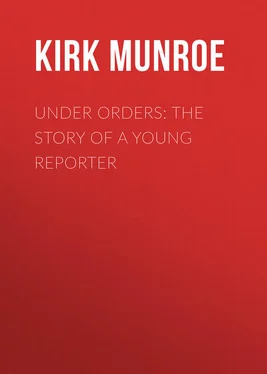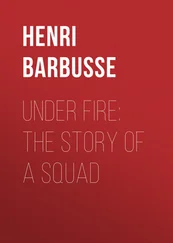Kirk Munroe - Under Orders - The story of a young reporter
Здесь есть возможность читать онлайн «Kirk Munroe - Under Orders - The story of a young reporter» — ознакомительный отрывок электронной книги совершенно бесплатно, а после прочтения отрывка купить полную версию. В некоторых случаях можно слушать аудио, скачать через торрент в формате fb2 и присутствует краткое содержание. Жанр: foreign_prose, foreign_children, на английском языке. Описание произведения, (предисловие) а так же отзывы посетителей доступны на портале библиотеки ЛибКат.
- Название:Under Orders: The story of a young reporter
- Автор:
- Жанр:
- Год:неизвестен
- ISBN:нет данных
- Рейтинг книги:4 / 5. Голосов: 1
-
Избранное:Добавить в избранное
- Отзывы:
-
Ваша оценка:
- 80
- 1
- 2
- 3
- 4
- 5
Under Orders: The story of a young reporter: краткое содержание, описание и аннотация
Предлагаем к чтению аннотацию, описание, краткое содержание или предисловие (зависит от того, что написал сам автор книги «Under Orders: The story of a young reporter»). Если вы не нашли необходимую информацию о книге — напишите в комментариях, мы постараемся отыскать её.
Under Orders: The story of a young reporter — читать онлайн ознакомительный отрывок
Ниже представлен текст книги, разбитый по страницам. Система сохранения места последней прочитанной страницы, позволяет с удобством читать онлайн бесплатно книгу «Under Orders: The story of a young reporter», без необходимости каждый раз заново искать на чём Вы остановились. Поставьте закладку, и сможете в любой момент перейти на страницу, на которой закончили чтение.
Интервал:
Закладка:
Myles envied this reporter, as he also did another who was sent out to the very New Jersey village in which his own home was located. How he did wish he might have that assignment.
At length when the others had been sent away on their respective errands Mr. Haxall called his name, and he stepped forward with a quickly-beating heart to receive his first assignment.
“I only wanted to know your city address, Mr. Manning,” said the city editor, looking up with a pleasant smile. “We find it necessary to know where our reporters live, so that in an emergency they may be reached out of office-hours.”
When Myles had given the required address he still remained standing before the desk. Noticing this Mr. Haxall again looked up and said:
“Is there any thing else?”
“Yes, sir,” answered Myles, hesitating and becoming very red in the face, like a school-boy before his master, “I wanted to say that I haven’t any dress-suit.”
“Haven’t what?” asked the city editor, in amazement.
“A dress-suit.”
“Haven’t a dress-suit?” repeated Mr. Haxall, with a perplexed air, and regarding Myles as though he feared for his mental condition. “Well, what of it?”
“Why, I thought the reason you engaged me was because I owned a dress-suit. Mr. Van Cleef told me so.”
“Oh,” laughed the city editor, tilting back in his chair for the fuller enjoyment of his merriment. “That’s a good one! And now it seems that you don’t own a dress-suit, after all. Well, I am sorry; but never mind, we will try to get along without it, and I will find something for you to do directly that won’t require one.”
So the confession was made and Myles had not lost his place, after all. He resumed his seat with a light heart and for another hour patiently awaited orders. In the meantime several men came in, wrote out their reports, handed them to the city editor, and were sent off again. Mr. Haxall filed most of these reports on a hook without even glancing over them.
At the end of an hour, when the office was completely deserted by all except the city editor and himself, Myles was again called by name.
“Now,” thought he, “I am surely to get an assignment.”
And so he did, though it was by no means such an one as he expected. Handing him a ten-cent piece, the city editor said:
“I find that I can’t take time to go out for lunch to-day, Mr. Manning, and as the office-boys seem to be absent, will you kindly run out to the nearest restaurant and get me a couple of sandwiches?”
It was disappointing and mortifying to be sent on such an errand, and for an instant Myles’ pride rebelled against it. Then the words “under orders,” together with Van Cleef’s advice, flashed into his mind, and with a cheerful “Certainly, sir,” he started off.
When he returned and laid the sandwiches, neatly done up in thin white paper, on Mr. Haxall’s desk, that gentleman said:
“I wish you would just step over to Brooklyn, Mr. Manning, and report to Billings at Police Head-quarters. He has charge of the horse-car strike over there, and telegraphs that he can use another man to advantage.”
“Is he a police captain, sir?” asked Myles, not knowing who Billings might be.
“A police captain? Of course not. What put that idea into your head?” replied Mr. Haxall, a little sharply. “Billings is one of our best reporters, and, as I said, is in charge of this street-car strike.”
“Oh, thank you, sir,” answered Myles, as he started off greatly enlightened by this explanation.
He had no difficulty in finding Brooklyn, because he had been there before; but he was obliged to inquire the way to Police Head-quarters. A few years ago he would have had a long walk before reaching it, for not one of the hundreds of horse-cars that usually throng the tracks on Fulton Street was to be seen. Their absence made that part of the city seem strangely silent and deserted; but fortunately the elevated trains were running, and Myles soon reached his destination.
The street in front of Police Head-quarters was blocked by a good-natured throng of strikers, through which Myles had some difficulty in forcing his way. At the door he was met by a policeman, who gruffly said: “No admittance, young man,” and immediately afterward, when Myles had stated his business, “Certainly, walk right in. You will find Mr. Billings in the inspector’s room.”
Now Myles had formed an impression of Billings, which was that he must be a man much older than himself, and probably larger and stronger, or else why should he be detailed for this especial work? He expected to find him busily engaged in writing, or dispatching other reporters hither and thither, and having the anxious, self-important air of one who occupied a delicate and responsible position.
The real Billings as he there appeared, seated at a table in the inspector’s room intent upon a game of dominos with the inspector himself, was about as different from this impression as it is possible to conceive. He was a slightly-built, delicate-looking young man, apparently not any older than Myles, and with a beardless face. He was exquisitely dressed, deliberate in his movements, and so languid of speech that it seemed an effort for him to talk. Myles remembered to have seen him in the Phonograph office that morning and to have wondered what business that dude had there.
However, this was undoubtedly the Billings to whom Mr. Haxall had ordered him to report, and he accordingly did so.
“Yes,” said Billings, with a gentle drawl, as he looked up from his game and regarded Myles with a pair of the most brilliant and penetrating eyes the latter had ever seen. “Just had a dispatch about you from Joe (Mr. Joseph Haxall). New man. Name of Manning. Break you in. Well, Manning, there’s a strike. No horse-cars all day. Railroad officials about to send car out on B – Avenue line. Leaves stable in fifteen minutes. Probably be some fun. You may go and ride on this car. Have a good time. Take it all in, then come back here.”
Myles could have choked the little fellow who coolly sat there telling him to do thus and so. For the second time that day he was strongly tempted to rebel and to maintain his dignity. The idea of that “little absurdity,” as he mentally styled Billings, issuing commands to him! Then for the second time came the words “under orders.” Had he not been ordered to obey Billings? To be sure he had, and with an “All right” he left the building.
As he made his way toward the car-stables he wondered why Billings had not undertaken that ride himself, as he seemed to have nothing else to do except play dominos. The more he thought of it the more he became convinced that it was because Billings was afraid.
CHAPTER V.
THE KIND OF A FELLOW BILLINGS WAS
“YES, Billings must be afraid,” said Myles, to himself, “and I don’t know but what I would be, too, if I were such a white-faced little chap as he is.” Here Myles threw back his own broad shoulders, held his head a trifle higher than usual, and rejoiced in the stalwart frame that had been such an ornament in the X – “‘Varsity” boat. “I wonder what Mr. Haxall meant,” he continued to himself, “by speaking of him as one of the best reporters on the Phonograph . If he should see him at this moment I rather think he would call him something else. How little a city editor can really know of his men any way!”
While thus thinking Myles was threading the unfamiliar streets of a city as strange to him as though it had been a hundred miles from New York, in search of the car-stables of the B – Avenue line.
It took him so long to find them that, when he finally did so, the car on which he was ordered to ride had been gone some ten minutes. There was nothing to do but overtake it if possible, and the young reporter started down the track at the same pace he was accustomed to set for his crew when they were out for a “sweater,” as they called their training runs.
Читать дальшеИнтервал:
Закладка:
Похожие книги на «Under Orders: The story of a young reporter»
Представляем Вашему вниманию похожие книги на «Under Orders: The story of a young reporter» списком для выбора. Мы отобрали схожую по названию и смыслу литературу в надежде предоставить читателям больше вариантов отыскать новые, интересные, ещё непрочитанные произведения.
Обсуждение, отзывы о книге «Under Orders: The story of a young reporter» и просто собственные мнения читателей. Оставьте ваши комментарии, напишите, что Вы думаете о произведении, его смысле или главных героях. Укажите что конкретно понравилось, а что нет, и почему Вы так считаете.












